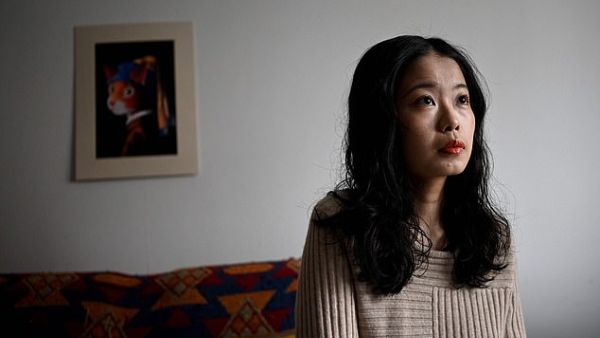A high profile sexual harassment case against an influential state TV host has begun in Beijing today, with his accuser calling it a major moment in the country's still-young #MeToo movement.
Zhou Xiaoxuan, 27, accuses Zhu Jun, a popular media figure, of forcibly kissing her in 2014 when she was working as an intern at state broadcaster CCTV. She is asking for a public apology as well as 50,000 yuan (£5,700) in damages.
Zhu, 56, has denied the accusation and filed a defamation case against Zhou.
On her social media page, Zhou announced the trial for her lawsuit, which was delayed for two years and reflects the challenges Chinese women have in pursuing sexual misconduct complaints despite the spread of the global #MeToo movement.
She wrote in a post yesterday: 'For the past few days, I have often been asked: What have you gone through since voicing [the case] in 2018?
'There are some very difficult times, like when I had to go to the hospital for a psychiatric evaluation because the lawyer of the defendant suspected me of having paranoia.
'But there are also some very, very good times, because I stand up and I have been found by so many girls with similar experiences, and I have also found so many girls.
'At the beginning, we only knew to weep and hug together, but later we learned to hold hands and become each other's light, to survive and fight,' Zhou said.
In front of dozens of cheering supporters at a courthouse Wednesday, Zhou said she hoped her case would encourage other victims of gender violence in a system that gives them few options to pursue complaints.
'Even if ultimately in this case we don't get a legal win, as long as we can show to a lot of people (that) there are people like me, those of us who are victims of gender violence, that´s already a type of win,' she said outside the Haidian District People's court in Beijing.
Zhu is a former host of the country's annual Spring Festival Gala - one of the world's most-watched television shows - and other major broadcast events.
Zhou said she found herself alone in a dressing room with Zhu in 2014, and that he groped her after asking if she wanted to continue to work for the channel after her internship.
When she initially reported the case to police, she said she was told that speaking out would affect the image of the state broadcaster where Zhu worked and hurt the feelings of those who admired him.
Zhou's case against Zhu was originally filed under the 'personality rights' law - covering rights relating to an individual's health and body - but her lawyers have asked for it to be considered under the new legislation.
She was among a wave of people who came forward in 2018 when an emerging #MeToo movement rocked China.
The global movement took off in 2018 in China when a college student in Beijing publicly accused her professor of sexual misconduct.
It helped to encourage activism in China, but it came at a time when President Xi Jinping´s government is tightening controls and stamping out dissent.
Women who complain face censorship and official resistance. The movement has seen few victories, and it was only in 2019 that sexual misconduct was added to court regulations as grounds for a suit.
In a rare victory, a woman who used alias Liu Li won a case against her former boss in July. The social worker in the western city of Chengdu was required to issue a public apology but no damages were awarded.
'Together, we want to demand answers from history,' read a sign held by a few dozen supporters outside the courthouse in Beijing on Wednesday. Other carried #Metoo signs.
Many yelled 'jiayou,' or 'add oil,' a common Chinese phrase as reassurance to Zhou, who cried after speaking.
Videographers working for foreign news agencies were taken away by police soon after Zhou gave her statement. It was unclear why they were held.
This article has been adapted from its original source.








